 Petzlover
Petzlover Brug is originated from United States but Jagdterrier is originated from Germany. Brug may grow 6 cm / 3 inches higher than Jagdterrier. Both Brug and Jagdterrier are having almost same weight. Both Brug and Jagdterrier has same life span. Both Brug and Jagdterrier has almost same litter size. Brug requires High Maintenance. But Jagdterrier requires Moderate Maintenance
Brug is originated from United States but Jagdterrier is originated from Germany. Brug may grow 6 cm / 3 inches higher than Jagdterrier. Both Brug and Jagdterrier are having almost same weight. Both Brug and Jagdterrier has same life span. Both Brug and Jagdterrier has almost same litter size. Brug requires High Maintenance. But Jagdterrier requires Moderate Maintenance
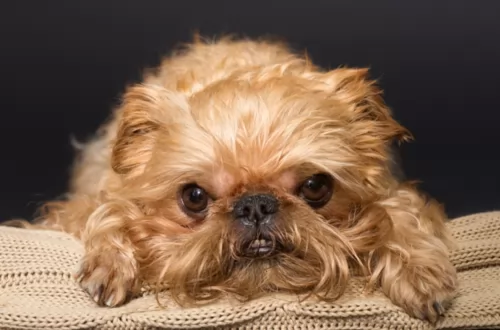 The Brug or Griffon Pug is not a purebred dog at this point in time. It is a cross between a Pug and a Brussels Griffon, currently known as a “designer dog” or a hybrid. This hybrid is really rare at this time but growing in popularity and breeders. Its exact history or original development is unknown at this time and needs to be researched as the hybrid develops into a breed, or breed clubs are formed. If you like either of the two breeds involved, you are sure to like the Brug. They are obviously not recognized by the major kennel clubs, but they are registered with a variety of hybrid/designer dog clubs. These include:
The Brug or Griffon Pug is not a purebred dog at this point in time. It is a cross between a Pug and a Brussels Griffon, currently known as a “designer dog” or a hybrid. This hybrid is really rare at this time but growing in popularity and breeders. Its exact history or original development is unknown at this time and needs to be researched as the hybrid develops into a breed, or breed clubs are formed. If you like either of the two breeds involved, you are sure to like the Brug. They are obviously not recognized by the major kennel clubs, but they are registered with a variety of hybrid/designer dog clubs. These include:
 Known as the German Hunt Terrier, the Jagdterrier hails from Germany and is a working terrier. In fact, the purpose of the Jagdterrier was for breeders to come up with an improved hunting terrier.
Known as the German Hunt Terrier, the Jagdterrier hails from Germany and is a working terrier. In fact, the purpose of the Jagdterrier was for breeders to come up with an improved hunting terrier.
The dog was developed at the turn of the 20th century, so its not a particularly old breed. There were a number of breeders who broke away from the German Fox Terrier Club, dedicating themselves to creating this newer terrier.
The first Jagdterriers were created by mixing the Old English Fox Terrier with a number of Black and Tan Hunting Terriers. Other dogs used to develop the Jagdterrier were German Pinschers, Welsh Terriers and English Wirehaired Terriers.
Today he is considered a superb hunting dog.The German Hunting Terrier Club was was founded in 1926.
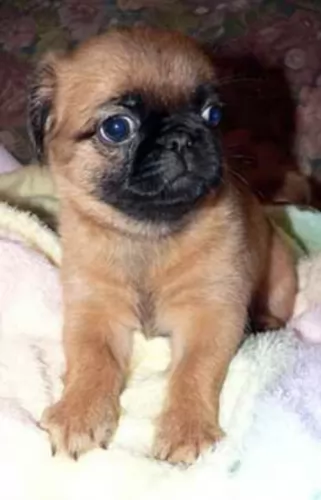 Like its two parental breeds, the Brug is a smaller sized dog – both parents are lab dogs and so is the Brug. Because they are hybrids, Brugs can be very different in appearance but most seem to have large eyes, squishy faces, black masks, fluffy hair, long black whiskers, short fluffy hair, flat ears and a fluffy tail. They could be in any of a number of colors including fawn, black, cream or apricot.
Like its two parental breeds, the Brug is a smaller sized dog – both parents are lab dogs and so is the Brug. Because they are hybrids, Brugs can be very different in appearance but most seem to have large eyes, squishy faces, black masks, fluffy hair, long black whiskers, short fluffy hair, flat ears and a fluffy tail. They could be in any of a number of colors including fawn, black, cream or apricot.
 The Jagdterrier is a tenacious hunter, taking on lots of wild creatures such as boars, badgers and even cougars.
The Jagdterrier is a tenacious hunter, taking on lots of wild creatures such as boars, badgers and even cougars.
He is of medium size standing between 33 and 40cm in height and weighing 7-10kg.
He has a coat of black and tan which can also be a dark brown shade or be a charcoal color. The Deutscher Jagdterrier is a compact, well-proportioned dog with a wedge shaped head and flat skull. The ears are set high and go up before they come down to form floppy ears. The tail has always been docked at about one third of the tail. These days it is often left long, being carried raised.
Active, athletic and alert, the Jagdterrier is also social, intelligent, strong-willed and confident. He is a serious hunter but can make an excellent pet, especially when trained and socialized.
He is energetic so he will require owners who are prepared to include him in all their activities. They are good around children, but their hunting side makes them long to be outdoors busy with exciting activities.
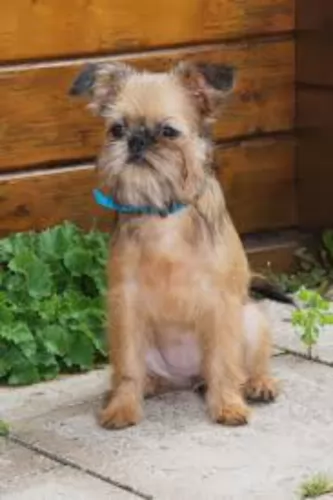 This hybrid is a loyal little dog. They are an affectionate lap dog that wants to be with his humans all the time. They have a very pleasant disposition and do well with children and other dogs. They might be shy to begin with but will warm up to affection. However, they are willful and self-important at times. This is tempered by their great sense of humor and empathy to its peoples’ moods. Left alone too long, they will tend to bark excessively.
This hybrid is a loyal little dog. They are an affectionate lap dog that wants to be with his humans all the time. They have a very pleasant disposition and do well with children and other dogs. They might be shy to begin with but will warm up to affection. However, they are willful and self-important at times. This is tempered by their great sense of humor and empathy to its peoples’ moods. Left alone too long, they will tend to bark excessively.
 Your Deutscher Jagdterrier is an intelligent dog who enjoys the company of his human family, particularly when they are active and can meet his high energy needs and his desire to be busy.
Your Deutscher Jagdterrier is an intelligent dog who enjoys the company of his human family, particularly when they are active and can meet his high energy needs and his desire to be busy.
They are quite wary with strangers and this makes them alert watchdogs. They are affectionate and playful with children if the children know how to respect them. Because of their hunting skills, they can be a bit of a threat around small animals in the home.
He is a quick learner and responds well to training and socialization. He will thrive on living in the countryside, but wherever you live with your Jagdterrier, give him plenty of exercise, a warm, dry bed, good food and your love and devotion, and he'll respond by being a super pet and companion.
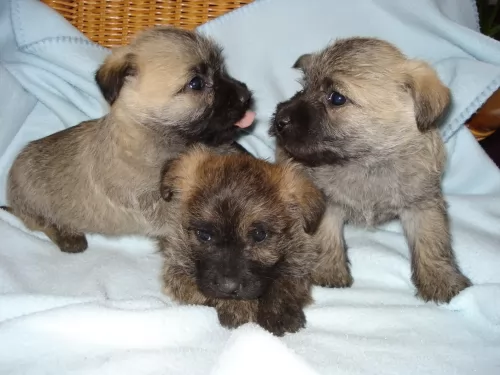 Usually the hybrid dog can have better health than either of the parents. This is true with the Brug as well, but there are also some issues they may inherit from the parents or face simply because of their size and complexion. These include:
Usually the hybrid dog can have better health than either of the parents. This is true with the Brug as well, but there are also some issues they may inherit from the parents or face simply because of their size and complexion. These include:
 You’re not going to be taking a sick Jagdterrier to the vet often as this is generally a healthy dog breed who can reach 13, 14 or 15 years of age with good care.
You’re not going to be taking a sick Jagdterrier to the vet often as this is generally a healthy dog breed who can reach 13, 14 or 15 years of age with good care.
He may be prone to a genetic breed disorder known as Primary Lens Luxation. Sometimes people are given prescription eye drops to constrict the pupil ad help the subluxated lens from getting worse.
This is a painful hereditary condition that leads to blindness. It affects many breeds of dog, particularly terrier-type dogs.
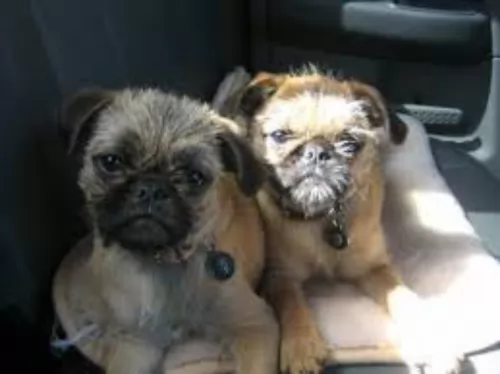 Don’t let this dog get overweight. Feed a high quality dry food intended for small or toy dogs. One fourth to one half of a cup per day in two separate meals is what is recommended.
Don’t let this dog get overweight. Feed a high quality dry food intended for small or toy dogs. One fourth to one half of a cup per day in two separate meals is what is recommended.
Patella Luxation or slipped knee caps – small dogs often have this issue. The patella is the knee cap and layman often called it a slipped knee cap, but it is also called slipped stifles. The femur, the tibia and the patella do not line up and this causes an abnormal gait or even lameness. Puppies are born with this, but it does not exhibit symptoms until years later. Arthritis is the most common result. Occasionally surgery is required.
Eye Issues – Cherry eye, a genetic disease, as well as irritation from air borne particles, allergies or scratches.
Skin Allergies – They can have skin allergies so watch for excessive licking or scratching.
Breathing Issues – Asthma and respiratory issues are common among small dogs with these types of faces.
Like their 2 breed parents, the Brug is a small but energetic hybrid. They need to play and run on a daily basis. Leash walks are good, but they need a yard or dog park as well. They are athletic little dogs and are good at tracking, obedience and agility. You cannot force them to do an activity but if its fun they will jump right in.
 Your energetic Jagdterrier will do well on a high-quality dog food, of which there are some good ones on the market.
Your energetic Jagdterrier will do well on a high-quality dog food, of which there are some good ones on the market.
If you do buy a commercially manufactured dog food, make sure that you read the instructions on the packaging so as to adhere to portion control. You can’t afford to have your pet becoming obese as this opens up a host of problems, and it can also shorten your dog’s life-span.
If you invest in high quality kibble, try to add in some nutritious and tasty home-made food such as cooked chicken, some brown rice or pasta and some vegetables. It is always wise to add in some raw meat from time to time as this promotes good health in your dog and prevents skin allergies.
Any diet for a dog should be in keeping with his age and his energy levels. Make sure your pet has constant access to fresh, cool drinking water.
Brush your Jagdterrier’s hair twice a week. It will keep the coat in tip top condition, but it also does your pet the world of good. He loves it when you take time out to be with him and to give him some special time. Brushing him also allows you to check him over for ticks and fleas.
Other grooming aspects for your dog will be to check on his nails and to clip them when they get too long. Ears should also be checked regularly to avoid a buildup of wax and dirt and teeth should be checked as well. Dental disease can lead to a host of illnesses which can be detrimental to the heart and kidneys.
Every dog needs different forms of exercise to remain lean and healthy. Options for exercise for your Jagdterrier can be going on walks, swimming and play time in the backyard.